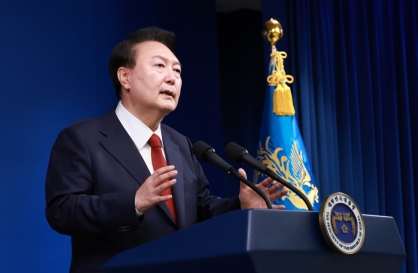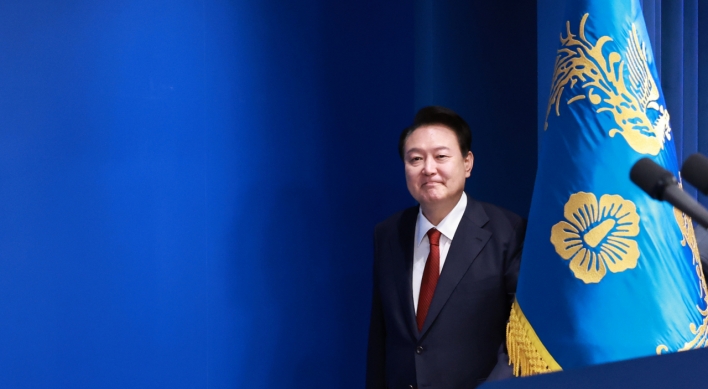Two expat filmmakers are out to show the world that there is more to Korea than K-pop.
Producer Aurelien Laine and director Dan Smukalla have been traveling across Korea interviewing Koreans of different generations and filming for “Sedae,” a new documentary due out next year.
Producer Aurelien Laine and director Dan Smukalla have been traveling across Korea interviewing Koreans of different generations and filming for “Sedae,” a new documentary due out next year.

Laine said it was quite common to portray Korea in simplistic outlines, such as its plastic surgery or educational craze, and that the idea of this documentary was to show a much broader range of people.
“When we think about Korea, we sometimes think about these people working 25 hours a day and just going partying in the evening because that is just the culture and everything,” he said. “We look at some people who actually have that life, which is becoming a caricature of the Korean lifestyle, but it’s just a part of the documentary. We really try to show a wide range, not just what we think the people are, but what they actually are, and we have found that a lot of people are surprising.”
The filmmakers have teamed up with two Koreans ― co-producer Min Byung-chae and assistant producer Nathan Oh ― to interview Koreans across as wide a spectrum as possible, from CEOs and students to rice farmers and fishermen.
The documentary will use the audio from these interviews, and illustrate them with images filmed in locations across modern Korea.
He said that there were advantages to this in terms of interviewing people.
“It makes people so much more comfortable to talk easily if they do not have a camera pointing at them,” said Laine.
He said the aim was to provide contrasts by combining images with audio from interviews on the same subjects. There were also obvious contrasts in some interviewee choices, such as a classical music teacher and a traditional Korean musician.
“For example, if we talk about school in the late 1950s we will see young kids right now going into hagwon and studying really late, or if we see people working hard at their desk, we can hear somebody talk about how to find a job 40 years ago.”
“We are really trying not to compare anything,” he said. “We are just trying to show things so that people can make up their own minds.”
Laine said that he thought the film would appeal to Korean and foreign viewers, but in different ways.
“Korean people that we spoke with, we found that they don’t ask the questions that we ask,” he said. “Next, foreigners who are interested in Korea, because it’s an angle that is not treated very often. Many people talk about the politics, the development, but not so much about the people.
“It’s especially making one specific point: It doesn’t matter how different people are ― they always come together at some point and live well together. I think that is a message that everyone can look into and be interested.”
Laine said that they hoped to have the film ready for next year’s festivals, and hoped to have a first screening sometime in spring.
By Paul Kerry (paulkerry@heraldcorp.com)
“When we think about Korea, we sometimes think about these people working 25 hours a day and just going partying in the evening because that is just the culture and everything,” he said. “We look at some people who actually have that life, which is becoming a caricature of the Korean lifestyle, but it’s just a part of the documentary. We really try to show a wide range, not just what we think the people are, but what they actually are, and we have found that a lot of people are surprising.”
The filmmakers have teamed up with two Koreans ― co-producer Min Byung-chae and assistant producer Nathan Oh ― to interview Koreans across as wide a spectrum as possible, from CEOs and students to rice farmers and fishermen.
The documentary will use the audio from these interviews, and illustrate them with images filmed in locations across modern Korea.
He said that there were advantages to this in terms of interviewing people.
“It makes people so much more comfortable to talk easily if they do not have a camera pointing at them,” said Laine.
He said the aim was to provide contrasts by combining images with audio from interviews on the same subjects. There were also obvious contrasts in some interviewee choices, such as a classical music teacher and a traditional Korean musician.
“For example, if we talk about school in the late 1950s we will see young kids right now going into hagwon and studying really late, or if we see people working hard at their desk, we can hear somebody talk about how to find a job 40 years ago.”
“We are really trying not to compare anything,” he said. “We are just trying to show things so that people can make up their own minds.”
Laine said that he thought the film would appeal to Korean and foreign viewers, but in different ways.
“Korean people that we spoke with, we found that they don’t ask the questions that we ask,” he said. “Next, foreigners who are interested in Korea, because it’s an angle that is not treated very often. Many people talk about the politics, the development, but not so much about the people.
“It’s especially making one specific point: It doesn’t matter how different people are ― they always come together at some point and live well together. I think that is a message that everyone can look into and be interested.”
Laine said that they hoped to have the film ready for next year’s festivals, and hoped to have a first screening sometime in spring.
By Paul Kerry (paulkerry@heraldcorp.com)
-
Articles by Korea Herald









![[K-pop’s dilemma] Time, profit pressures work against originality](http://res.heraldm.com/phpwas/restmb_idxmake.php?idx=644&simg=/content/image/2024/05/08/20240508050705_0.jpg&u=20240508171126)

![[K-pop's dilemma] Is Hybe-Ador conflict a case of growing pains?](http://res.heraldm.com/phpwas/restmb_idxmake.php?idx=644&simg=/content/image/2024/05/07/20240507050746_0.jpg&u=)







![[Today’s K-pop] Stray Kids to drop new album in July: report](http://res.heraldm.com/phpwas/restmb_idxmake.php?idx=642&simg=/content/image/2024/05/09/20240509050659_0.jpg&u=)